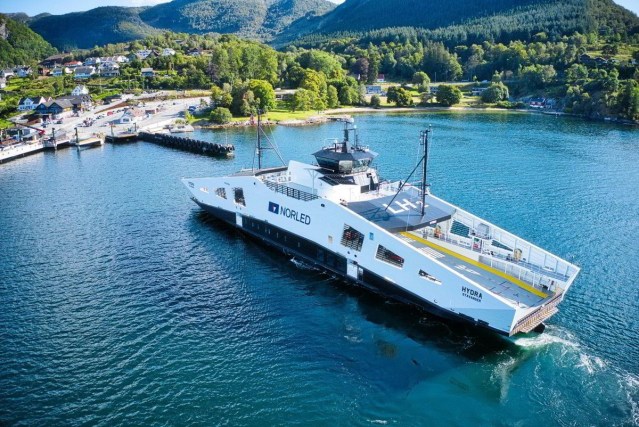“I look forward to Orkney being able to engage in a regional forum to share ideas and best practice on connectivity.” – Robert Leslie, SNP candidate , Orkney & Shetland

SNP delegates at their Aberdeen Conference have backed a proposal for a regional forum with neighbouring countries such as Ireland, Wales, the Faroe Islands and Norway to share ideas and best practices for improving connectivity in the islands and rural areas, including tunnels.
Speaking at the recent SNP Conference, Robert Leslie candidate for Orkney and Shetland, said that there must be a place for catamarans in plans to replace Orkney’s ageing internal ferry fleet.
While ‘astronomical price tags’ for ferry replacements had been banded about, Mr Leslie said there was ‘a cheaper, more efficient and environmentally sustainable solution on the horizon’.
“Orkney’s Churchill Barriers already prove that fixed links keep communities alive.
“Looking further north, we can see that tunnels might also play a part in ensuring our islands thrive rather than survive.
“Shetland already has plans to link some of its islands with tunnels, and I applaud Shetland Islands Council for presenting their vision and engaging positively with the Scottish and UK governments on this.
Having already spoken about the drivers of rural depopulation, including fuel poverty, which is inextricably linked to transport costs in rural and island areas, Mr Leslie said that the resolution would be crucial in stemming and reversing that trend.
He concluded: “I look forward to Orkney being able to engage in a regional forum to share ideas and best practice on connectivity and have pleasure in seconding this resolution.”
The SNP delegates in Aberdeen were debating a resolution from Paul Anderson of London branch on rural and island connectivity. In his contribution Robert Leslie referred to a recent Orkney International Science Festival (OISF) talk by Professor Alf Baird ‘A New Day for the Ferryman’ which you can read about here:
In his talk at the OISF, Prof Baird, spoke about the cheaper production costs of monohulls and of alternative fuels (electric and hydrogen).
The conference backed the resolution, welcoming the proposed delivery of an Islands Connectivity Plan, and supporting the following measures to improve rural and islands transport connectivity:
- For the Scottish Government to publish a series of short-term (0-6 months), medium-term (6 months – 5 years) and long-term (5 – 20 years) objectives to improve rural and island transport connections.
- To support the creation of a dedicated Scottish Parliament Committee to oversee this progress and provide regular democratic scrutiny.
- To consult with local authorities and devolve further powers to enable them to oversee the development of existing and new transport routes.
- To propose a regional forum with neighbouring countries such as Ireland, Wales, the Faroe Islands and Norway to share ideas and best practices for improving connectivity in the islands and rural areas, including tunnels.
Categories: Local News
















A much stronger driver of rural depopulation than transport links might be the dismal digital connectivity. Would this finally be improved, this could enable many more people to work from home and thereby reduce any need for commuting. There are currently many quite decently paid jobs which cannot possibly be done from home in the isles.
Fuel poverty: well, Shetland apparently has seen what grave mistakes were made in Orkney. They call for a Shetland tariff even before wind energy projects go online. Orkney has never done this… fuel poverty was and is rising despite rising wind energy generation. And it is sad to consider how much energy was regularly “wasted” due to curtailment. It should have been available for local use, for example through a parallel grid.
About the ferries: yes, they are ageing and yes, new ferries cost money, a lot of money. But, instead of finding innovative solutions, it seems everyone just comes up with the same ideas again and again. Tunnels? Costly and they come with other issues, from crime (everybody can come and go at any time) to costs. Currently, in the outer isles people do not need MOT for their vehicles. People can use their L-plates and drive on their own. Surprisingly, the latter is important for many elderly. All this would end with tunnels.
Has anybody ever calculated the potential feasibility of using (just an example) a smaller fleet of modern vessels on different timetables and perhaps even freight operations at night? Additional crew requirements do come with jobs and the benefits of jobs are never disputed. Has anybody ever calculated how a smart and sensible coordination of air and sea timetables for passengers as well as for freight could work out in practice? Cost-benefit analyses for such approaches appear to be completely absent.
These are just examples, there are many other options one could think of. Had they been considered, we would have heard about them. And it should not require costly feasibility studies, conducted by external agencies… in principle, OIC should well be capable of working this out… they should be able to compile the data required to work out the feasibility of different options. Is it the will that is lacking? Or simply the competence?
‘Share ideas and best practices’? In general, a good idea… because sometimes it is not necessary to re-invent the wheel.
But on the other hand, it should not stop a region such as Orkney (respectively their local authority) from getting their own little grey cells working to consider innovative solutions that are workable under their individual and specific circumstances.
If we are looking towards the Scottish Government to solve our problems then we will have a long wait and ultimately be in for a disappointment if its past performance is anything to go by.